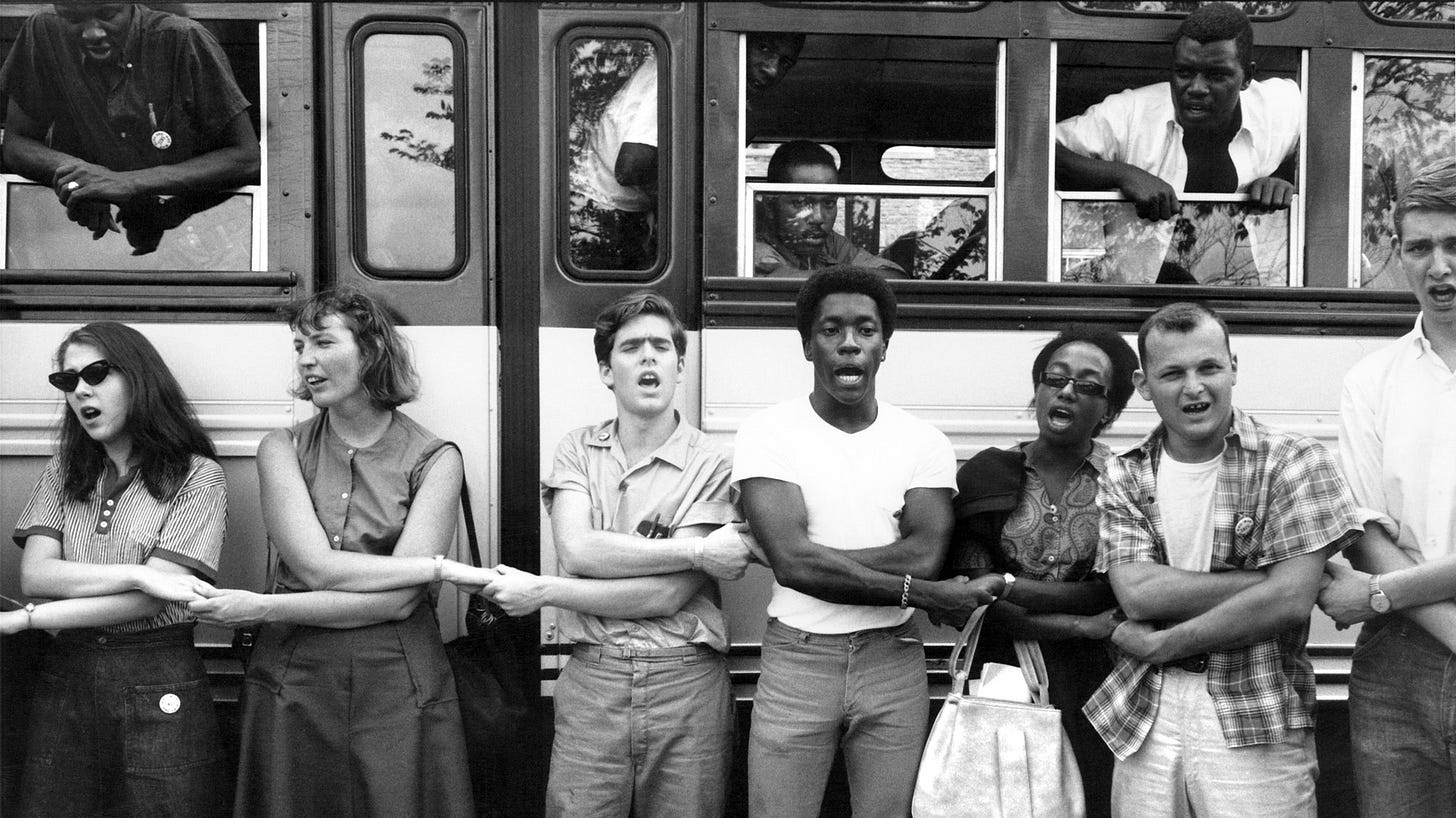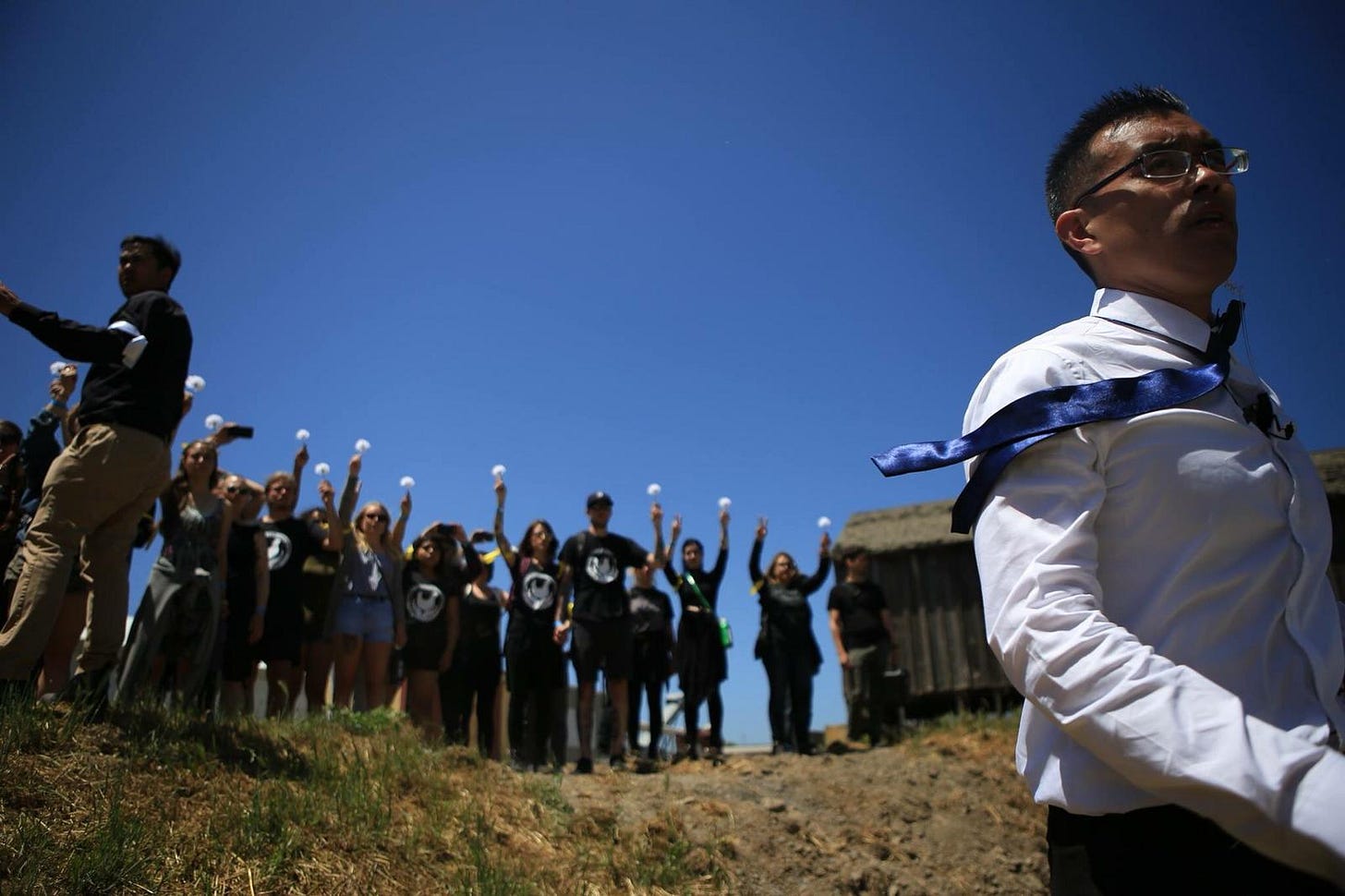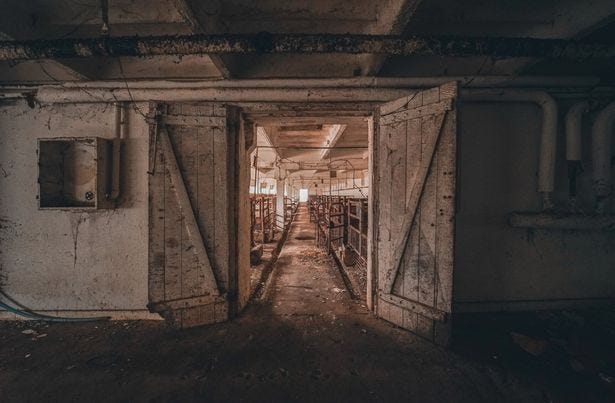Walking into a Slaughterhouse Gave Me Superpowers. You Can Get Them, Too.
Firsthand experience – or even just connections with people who have it – can engage and inspire the people around you. Here's how.
What’s up this week
Open rescue transforms the credibility and confidence of the animal rights movement. Animal advocates are dismissed as having no experience with animal husbandry, or mocked as ridiculous. But, as I argue in today’s newsletter, the open rescue movement can change that, by boosting the credibility of activists with firsthand experience, and injecting gravitas into a movement that is too often taken as a joke. There are lessons in this for anyone thinking about persuasion or change.
This Sunday, there will be a great opportunity to put that idea into practice: the Open Rescue Advocates meeting at 5 pm PT. If you’re convinced by my argument in this blog that open rescue can supercharge your activism, consider registering for the Open Rescue Advocates meeting on Sunday at 5 pm in SF and by Zoom. While it’s invite-only, for folks who have completed the Open Rescue Experience, if you have a particular interest or skill we may waive that requirement.
For the first time in history, lab-grown meat was approved for sale to consumers by the US Department of Agriculture. The New York Times calls it a “watershed moment for the alternative protein industry.” I am doubtful of this because, as a study commissioned by the Open Philanthropy Project found, difficulties with scaling lab-grown meat will “preclude the affordability of their products as food.” But it’s still an important breakthrough!
I released a statement about my relationship history, and its connection to the disturbing events that unfolded at the ALC earlier this month. The statement speaks for itself, so give it a read.
How to Get Vegan Superpowers
In 2004, I thought I had found the solution to animal rights. I had spent many years struggling to convince anyone around me of the merits of a vegan diet, but nearly everyone rejected my efforts. My friends barely paid me any attention. My family thought it was a phase. And my grandmother thought it was a mental disease, and had brief conversations with my parents about having me committed before I hurt myself further.
But then I came across a theory that seemed incredibly compelling: targeting college students with well-designed leaflets about factory farming. I was told by prominent figures in the movement that, because 2% of people receiving a leaflet would go vegetarian (and many more would reduce their meat consumption), I could save one animal for every two leaflets I handed out! Instead of focusing on the people I personally knew, with high quality conversations, I should focus on people I did not know (especially impressionable young people) with high volume outreach. The math was simple. If I handed out 100,000 leaflets, in my neighborhood near the University of Chicago, I could increase the number of vegans by 2000 — and save thousands of animals from torment!
There was just one problem: the theory behind leafleting had almost no evidence to support it. While it took me many years (and tens of thousands of leaflets) to make this realization, I eventually came across a broad and compelling body of research suggesting that “impersonal outreach,” i.e., efforts to change people we have few social ties to, are extraordinarily ineffective. That was consistent with my experience in Chicago. Despite the fact that I personally handed out over 100,000 leaflets over a 3-year time period, it felt like the local vegan community didn’t grow at all.
What works instead? Mobilizing people into networks of change. I spoke about this at the animal rights conference in 2014.
The general framework I described in this talk — Create (activists). Connect (the activists in networks). Inspire (them to direct action). — is still the operative framework I use to understand social change. Indeed, there is even more evidence that’s come out, since 2014, that mobilizing a social network is the best way (and perhaps only way) to change enduring systemic problems.
What that means is that those friends and family members who I started ignoring in 2004, in favor of mass outreach strategy, were exactly the people I should have been focusing on. As Stanford sociologist Doug McAdam found in his groundbreaking study of civil rights activism, strong ties are the foundation of social network mobilization.

However, that social networks framework still has limitations. While it sets out goals for a movement to achieve — get more people involved! inspire them to action! — it provides little guidance as to how to achieve those goals. And what I’ve realized from the last 10 years, and from a review of animal rights history, is that firsthand experience with factory farming, such as open rescue, is key to making the social network mobilization strategy work because it gives a movement credibility and confidence.
One can see this with my own life experience. Prior to 2007, I focused almost entirely on the volume of information I was distributing, rather than its credibility to the people around me. Especially in a high-information world — where people are constantly being bombarded with propaganda — that was a totally ineffective strategy.
“Why should I pay attention to what you have to say?” people would ask. “The USDA says animals are well treated, and that we have to eat meat. I trust them.”
Then something happened in 2007 that supercharged my credibility: I walked into a slaughterhouse for the first time. While I failed in my efforts to help one of the animals, something interesting happened when I went back into the real world. People, especially those closest to me, started paying much more attention to what I had to say.
“These are not just factories of violence, but of fear,” I would tell people. “And believe me: I have seen these animals huddling in fear. I’ve seen the whites in their eyes.”
The eyes of my friends and family would get big. There was something far more compelling about my information because I was delivering it from firsthand experience. It was like walking into a slaughterhouse gave me vegan superpowers.
This is a broader phenomenon in human persuasion and influence. We tend to treat firsthand, autobiographical experiences as more credible. While that often leads us astray — after all, individual observation is highly fallible — effective movements harness this source of credibility.
But (and here is the key bit) it’s often the case that the credibility of firsthand experience can transfer from one person to another. Consider these minor changes to the sentences above:
“These are not just factories of violence, but of fear. And believe me: my close friend has seen these animals huddling in fear. He’s seen the whites in their eyes.”
Having a direct social connection to someone who has observed the cruelties of factory farms may be nearly as powerful as observing it yourself. It’s as if the vegan superpowers granted by firsthand experience can be given to all our friends.
That brings me to the second reason that firsthand experience is so key: it gives us, and the movement, the confidence to inspire those around us. Once we have the attention of the people around us, it’s not enough to keep them engaged. We need to inspire them to act. And this is where firsthand experience is absolutely crucial. It shows us that we have the power to create change.
I told the story of “Roger” last week, a shy and soft-spoken software engineer who was transformed by his firsthand experience inside one of California’s largest turkey farms. Well, what is true of Roger is true of our entire movement. When we go straight to the frontlines, we suddenly realize we have the power to create change. We can literally save an animal’s life. But that power is not just limited to the physical act of rescue. It also extends to the political act of standing for animal rights.
Consider my own story. For nearly a decade, before my first experience in a slaughterhouse, I had virtually no impact on my friends and family. Yet almost instantly after walking into that first abattoir — and realizing that I had the power to carry a lamb out, if I chose to do so — my ability to inspire people was supercharged. The people I played Ultimate Frisbee with suddenly noticed that I had a new confidence, and seriousness of purpose, in speaking about animal rights. (One of the most influential advisors in DxE history, my friend David, was someone I converted to veganism after I walked into a slaughterhouse.) My family, who had previously mocked me for animal rights, suddenly began turning vegan or vegetarian, one by one. And, on a personal level, I went from being scared of my shadow, to fearing almost nothing, including death.
There was something about that firsthand experience that built an unshakeable confidence in me that has now lasted over 15 years.
Once again, however, it’s not just the people directly walking into slaughterhouses that gain from this confidence. Even being connected to those with firsthand experience can have tremendous impacts, especially if we are involved in the work someway. I have numerous friends who have worked as researchers, fundraisers, or other supportive roles for open rescue whose confidence has been supercharged by the mere connection to open rescue. For good reason: it’s the most badass work in animal rights!

Where does that leave those of us who are trying to create change? Quite simply, we need to give everyone in the movement the superpowers of firsthand experience. We need to give everyone the credibility and confidence they need to create change. But to date, there has been little effort to do that. While the Save Movement placed people at slaughterhouses, the experiences with animals at vigils were limited and contingent on police or industry consent. While DxE has organized numerous open rescues, there was never a system or strategy for scaling those programs up 100x.
That is precisely why we started The Simple Heart Initiative. To fill that enormous gap, and give everyone (including you) the superpowers I developed when I walked into a slaughterhouse in 2007.
Not all of you will change your friends and family, of course. But I’m betting, that if you get involved in open rescue in any capacity, you’ll see an immediate change to your credibility and confidence. Take me up on that bet.



Animal rescue is a noble path.
So relatable! When I was 1 year vegan in 2019, my grandma thought I needed an exorcism and I had to get a blood test to prove to my family I wasn’t dying.
I had been protesting, doing conversational activism (which I love) yet at the same time, I wasn’t seeing any real change in the world for animals. In fact, as vegan options grew, more animals live in cages, more are dying. But there was always something in the back of my head these past few years: there are people going onto the farms and saving lives.
It turns out that what these guys are doing is something we can all do. And I believe we will. Through our actions, we can pull liberation from our dreams directly into this reality for the animals, and ultimately for us all. Maybe I’ll see you in a conference room plotting a rescue one someday :)